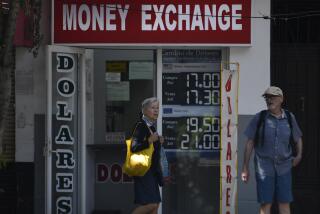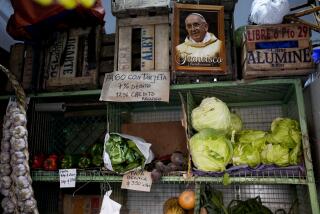Complaints About Government Grow : Nicaragua Feels Inflation as Well as Rebellion Pains
- Share via
MANAGUA, Nicaragua — The citizens of Nicaragua woke up one morning not long ago to find that the price of rice, a staple in their diet, had doubled. Beans and corn cost three times as much as before, and the price of milk had quadrupled.
And these were only prices controlled by the government. Prices on the black market were higher.
Nicaragua and its Marxist-led Sandinista government are fighting what has been a losing battle with inflation, and soaring prices have touched off a new round of complaints about the government. Non-Sandinista trade unions are threatening street demonstrations.
Along with the anti-Sandinista rebellion in the hills, the disarray in the marketplace is fueling a search by the government for a negotiated settlement of its disputes with the United States and with its Central American neighbors.
“The Sandinistas believe that all problems stem from the conflict with the United States,” a Western diplomat said. “A negotiated settlement is seen as a cure-all.”
Earlier this year, the Sandinista government predicted an inflation rate for 1985 of 40% to 60%. Since prices went up, no one has adjusted that forecast, but the rate is certain to be higher. In any case, it is difficult to calculate the inflation rate because of the chaotic condition of the Nicaraguan economy.
Consumers supplement their quotas of rationed goods with purchases on the black market. The official price of a pound of rice is 10 cordobas. On the black market, a pound sells for 45 cordobas.
A steep decline in the relative value of the cordoba, Nicaragua’s unit of currency, has meant even higher prices for some things. The official exchange rate is 28 cordobas to $1. On the black market, the rate is 500 to $1, making imports prohibitively expensive. And Nicaragua imports everything from tires to toothpaste.
Government price increases announced in February averaged 181% for eight basic foods plus meat. Salary increases meant to offset the higher prices averaged only 45%.
Money in Wheelbarrows?
“Pretty soon, our money will resemble that of Weimar Germany; people will be hauling it in wheelbarrows to buy a loaf of bread,” said Virgilio Godoy, a former minister of labor who heads the Independent Liberal Party, an opposition group.
Ironically, the latest round of price increases was set off by the government’s attempts to reduce a large fiscal deficit that, itself, spurred inflation. Last year, the government spent twice as much money as it collected from taxes and revenues from government-controlled enterprises. Earnings from such government-controlled exports as sugar, cotton and coffee all declined.
Before February, food prices were subsidized by the government. Then the Sandinistas decided that the government could no longer afford to keep prices low and passed on to consumers the cost of such basic goods as beans and rice.
In addition, the government plans for the first time to levy taxes on the incomes of self-employed citizens, on the tips of waiters and waitresses and on investments made since 1979. The Sandinistas also propose to freeze spending on social services.
Farmers Get 78% Boost
To spur production and reduce shortages, prices paid to farmers were increased an average of 78%--still not enough to keep up with increases in the price of goods that the farmers must buy.
Blame for rising prices is the one thing in abundance here. The government blames the rebels. It says the counterrevolutionaries--the contras, as they are called--have cut into farm production, creating scarcities and forcing increases in prices.
The government also charges that speculators, who somehow are able to divert state-controlled goods from government warehouses to the black market, are responsible in part for higher prices.
Police recently began a crackdown on speculators, officially estimated to number more than 100,000 in a population of 3 million. Vehicles have been searched for illicit goods at the entrance to towns.
Raids on Black Markets
A special police unit from the Ministry of Internal Commerce raids markets, looking for controlled items such as rice, which only the state is authorized to sell.
Official newspapers have reported frequent raids on alleged black marketeers. The pro-government Nuevo Diario said recently that the police had broken up a “paradise for speculators” in the city of Granada, where items ranging from rice to Soviet-made light bulbs were being sold at “prohibitive prices.”
According to one article, speculators had managed to corner the sale of student notebooks, gathering a good supply even before the state was able to deliver them to schools.
Vendors in Nicaragua’s traditional markets reply that the government itself is to blame for the shortages. Furthermore, they say, if illicit goods appear for sale in the markets, it is only because someone in the government has let them seep out.
A visit to the Eastern Market in Managua, the country’s largest, disclosed that government warehouses are indeed porous. Rice and sugar, both supposedly sold only through government channels, were available. So were medicines from the Soviet Bloc.
“What we do, we do openly,” a vendor named Dona Maria said in the market at the nearby town of Masaya. “What the government officials do, they do under cover.”
Dona Maria said that her husband, a shoemaker who is out of work because of a leather shortage, has taken up peddling to earn money.
“Selling to each other is the only road left to the poor,” she said.
The government decided late last year to compete with the black market by opening “parallel” markets where goods in great demand--cooking oil and toilet paper, for example--would be sold at high prices but at less than those on the black market.
The parallel market seems to have produced mixed results. Citizens complain that the government is playing an underhanded game, first by rationing goods because of scarcities and then by selling the same items at higher prices.
And the new markets fail to meet the demand. La Colonia Supermarket, a parallel outlet in Managua, was recently out of sugar, rice and beans, all goods in great demand that nevertheless could be found at the Eastern Market.
At La Colonia, the most abundant items were canned goods from Bulgaria--four aisles of them. No one seemed to know what the cans contained.
“I think it’s meat,” a saleswoman said.
“No, it’s vegetables, heavily spiced,” another said. “I hear it tastes bad.”
Price gouging for services is another target of official crackdowns. The Sandinista newspaper Barricada accused undertakers in Managua of charging 2,000 cordobas to seal graves with cement that costs only 60 cordobas.
Price increases have produced a lot of grousing but no new political action against the Sandinista government. In part, absence of activism stems from continued public support for the Sandinistas as Nicaragua’s legitimate revolutionary government.
In addition, most organized workers belong to Sandinista-controlled unions. Street-by-street surveillance also discourages mobilization against the government.
More to Read
Sign up for Essential California
The most important California stories and recommendations in your inbox every morning.
You may occasionally receive promotional content from the Los Angeles Times.










